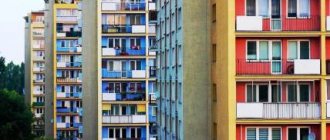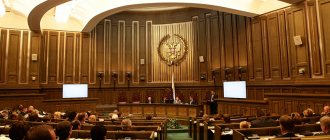Legislative regulation
The rules of living in modern apartment buildings are regulated by federal and regional legislation. They are stated in the following documents:
- Constitution of the Russian Federation (Article 40).
- Civil Code (Article 290).
- Housing Code.
- PP indicating “Rules for the use of residential premises” No. 491.
- Code of Administrative Offences.
The issues of living in apartment buildings are reflected more deeply in regulations created at the municipal level. For example, HOAs and other management companies regulate the following areas:
- Sanitary and fire safety standards.
- The procedure for paying utility bills for the use of common property.
- Time to carry out major repairs and other repair work. Carrying out redevelopment of apartments.
- Rules for using parking spaces near the house.
- Keeping and walking animals.
- Maintaining cleanliness of the area and common areas.
- Actions in emergency situations.
- Responsibility for violating the rules of residence.
Such norms, which are internal and developed by municipal authorities, have legal force at the same level as state ones. They are compiled individually for each home.
Moreover, each resident has the right to propose his own changes and adjustments . The management company is obliged to notify other residents about this. Most often, a general meeting is organized at which voting is held and a decision is made to approve or reject proposals.
If the requirements have been satisfied, they are documented and signed. After this, the changes become an internal document of the house and are mandatory for all residents.
Internal rules of residence cannot contradict the current legislation of the Russian Federation and are drawn up on its basis.
Rights of residents of an apartment building
Residents of the house have certain rights regarding their apartments. In addition to the owner of the home, other persons may live in it temporarily or permanently. They also have rights and responsibilities.
Owner's rights
There are several types of rights relating to living space:
- Ownership. It means that the citizen is the owner of the housing space and has the right not to allow anyone into the housing, especially strangers.
- Right of use. The owner can make money from his apartment by renting it out. And he can also live in it.
- Right of disposal. The owner of an apartment has the right to do whatever he wants with it: sell, exchange, donate.
According to the housing code, the purpose of square meters is to live on them. However, the owner has the right to engage in labor activities in his apartment: establish a studio, create and sell goods, work. The main thing is that this does not infringe on the rights of others. There should be no noise, especially at night. If production is carried out, it should not involve poisons or strong-smelling substances.
The owner of the housing space has the right to rent it out to other persons: individuals and legal entities. In this case, an agreement is concluded and only accommodation is provided. For example, a rented apartment can be used to accommodate business travelers.
Standards of residence in MKD
Noise in the apartment
In SanPiN 2.1.2.2645-10 and art. 23 Federal Law No. 52 prescribes sanitary standards regulating noise levels in residential premises and preserving the rights of citizens to sleep and rest. So, in the daytime, namely from 7:00 to 23:00, the noise level cannot exceed 45 dB. From 23:00 to 7:00 this figure decreases to 30 dB.
Types of noise prohibited in residential premises at night:
- construction and repair work, moving furniture;
- screaming, swearing, noisy parties;
- playing musical instruments, listening to music or watching movies at high volume;
- use of firecrackers, rockets and fireworks;
- Repeated activation of the car alarm.
Repair work must be coordinated with the management company and carried out at the time established by the rules - from 9 a.m. to 7 p.m. A period is provided for daytime rest, when noisy work must be suspended and replaced with others.
Many regions have extensive regulations governing construction and renovation work. For example, in the Moscow region, daytime rest falls between 13:00 and 15:00. In some regions, the frames have been changed from noon to three o'clock in the afternoon.
It is worth understanding that the law on silence applies not only to residential premises, but also to the local area and common areas. Establishments (cafes, nightclubs, hotels, shops) located near residential buildings are required to respect the rights of resident citizens.
On weekends and holidays, the rest schedule is shifted by 2 hours and starts not at 23:00, but at 21:00 and continues until 9:00. From 2021, residents are allowed noisy festivities on January 1 throughout the day. This rule does not apply to other holidays.
Special attention is paid to such types of noise as the crying of a child. If a child’s crying is heard regularly and for a long time, residents have the right to contact the guardianship authorities to check whether the minor is being properly supervised.
Smoking
Law No. 15 “On the Protection of Citizens’ Health...” provides for a ban on smoking in public places. According to paragraph 1 of Article 12, the use of tobacco products in an apartment building is unacceptable:
- in the entrances;
- on staircases and playgrounds;
- in elevators, basements, attics;
- on the shared balcony;
- in the premises and offices of the HOA.
Smoking is allowed only in apartments and rooms, as well as in specially equipped places on the premises. Smoking may be prohibited on personal balconies if the smoker's neighbors contact the housing inspectorate and can prove that tobacco smoke penetrates into their living quarters.
In corridor-type dormitories, kitchens, showers and toilets are considered common areas and are subject to a smoking ban.
Animal keeping
Pets cannot live in stairwells, attics and basements. Since 2021, some provisions of the Federal Law “On the Responsible Treatment of Animals” have come into force, which prohibit keeping wild animals in an apartment. These include:
- some types of snakes;
- crocodiles;
- lions;
- tigers and other wild cats;
- the Bears;
- wolves and many others.
Dogs on the premises must be walked exclusively in muzzles and all responsibility for the behavior of the four-legged friend is shifted to its owner. Walking animals is allowed in specially equipped places and is strictly prohibited on children's playgrounds.
If residents of an apartment building are uncomfortable because of loud barking from a dog or other noise, they have the right to contact the owner of the animal to find ways to solve the problem. Also, in case of violation of the established Rules, each citizen can send a statement to the local police officer with a request to investigate and punish the culprit.
Maintenance of common and adjacent property
According to paragraph 2 of Resolution No. 491, common use property includes:
- Stairs and landings.
- Elevator and its shaft.
- Corridors and utility rooms.
- Attics and roof, load-bearing structures.
- Premises for social and domestic needs.
- Land adjacent to the house.
In paragraph 4 of Art. 30 of the Housing Code states that apartment owners must comply not only with the rules of living in an apartment building, but also with the rules for the use and maintenance of common property.
Residents are required to maintain the safety and order of common property.
- Damage to walls and railings, doors and windows is prohibited.
- The elevator must be operated in accordance with established rules - it must not be loaded with large items in the form of furniture or building materials.
- The entrance door should always be closed, as should the rooms providing access to the roof, boiler rooms and boiler rooms.
- It is forbidden to obstruct landings, passages and emergency exits with any property, as this is contrary to fire safety rules.
- It is prohibited to litter the area adjacent to the house with garbage and various wastes.
- Traffic and parking rules inside the yard must be observed; trucks cannot be parked.
- Unauthorized installation of garages, fences, cutting down trees and green spaces is excluded.
Use of residential premises for other purposes
Residential premises can be used for professional or individual entrepreneurial activities, if this does not lead to a violation of the rights of other residents and does not affect the requirements that residential premises must meet.
The location of industrial production, hotels, and shelters is prohibited (with the exception of cases prescribed in Article 16 of the Federal Law “On Freedom of Conscience and Religious Associations”).
Emergency situations
Any tenant who encounters a malfunction of communication systems (gas, electrical or sanitary) is obliged to report it to neighbors (if the breakdown extends to their apartments) and the management company. She, in turn, must promptly respond to the request to fix the breakdown and eliminate its consequences.
Additional documents governing such situations:
- Resolution No. 354 of May 6, 2011.
- RF PP dated 06/09/2007 No. 360 “On approval of the Rules for concluding and executing public agreements on connection to utility infrastructure systems.”
- Civil Code of the Russian Federation.
Safety standards
Residents and the management company are required to comply with standards aimed at ensuring the proper level of safety.
Forbidden:
- Provide open access for outsiders to pass through.
- Hush up problems or continue to operate faulty communication systems.
- Violate fire safety rules.
If the owner of an apartment leaves his home for a period exceeding 10 days, he is obliged to notify the management company and neighbors of his departure. It is necessary to turn off the gas and water supply and leave your telephone number so that you can contact in case of problems.
Violation of neighbors' rights and liability
If a citizen violates the rights of residents and the rules established by the building management, an act is drawn up. Based on this, the offender will be punished. He may be given a written warning or a fine.
Penalty table.
| Accommodation without registration | If relatives come to the owner and stay for a long time, after 3 months they are required to obtain temporary registration. Otherwise, the fine is 5 thousand rubles. |
| Flooding of residents from below | 5 thousand rubles. |
| Making noise at inappropriate times | from 1 to 2 thousand rubles. |
| Repair or redevelopment | If these actions are carried out with violations and result in suffering for neighbors - a fine of 2 thousand 500 rubles. |
Is it possible to change your partner?
We do not choose our relatives; they are given to us by birth. There is one exception, this is the spouse. We choose it ourselves. We see his advantages and disadvantages and agree to live with him. Why then are we trying to remake this person? In any case, this is impossible! You cannot change your partner, you can only engage in self-improvement.
Therefore, if love is alive, it will overcome any difficulties. It is necessary to be more tolerant of the shortcomings of the other half. Try to find more good things. Be more critical of yourself. No person is perfect. You also have your flaws. And perhaps your partner has to endure your obnoxious character.
Good mood
It’s better not to bring troubles at work or a bad mood home. A gloomy and dissatisfied partner is not the most interesting interlocutor. It is advisable to express all complaints against your other half not by shouting, insulting and throwing tantrums, but in a calm, accessible form. Smile more, a smile always evokes positive emotions in response. You don’t have to take everything seriously; humor saves you in difficult situations.
If you are upset by your partner's actions, do not act impulsively. First calm down, then act thoughtfully. Respect each other. It's hard to maintain love when there is no respect. Consider your partner's opinion. By ignoring your spouse's point of view, you put him in a humiliating position.
Ability to negotiate
Compromise is the basis for a happy existence for partners. Listen to each other, consult. If one of the spouses does whatever he wants without asking his partner for advice, conflict is guaranteed.
The most important thing is the desire to do well not only for yourself, but also for the person who is next to you. There are times when it is impossible to reach an agreement. It’s better to restrain yourself, not to inflame the conflict to the point where there is no turning back.
What do kisses on different parts of the body mean?
Trust in each other
If you suspect your partner, keep an eye on him, this will inevitably lead to quarrels. Your partner is a person just like you, he also needs personal space. He has his own circle of interests. It's good when you have a common hobby. This is an ideal option and another reason to spend time together. But if this is not the case, give your partner the opportunity to pursue his hobbies.
Mistrust breeds jealousy. Jealousy is the main enemy of the peaceful existence of partners with each other.
How to protect your rights and where to go
The method of protection depends on the situation. Basically you can contact:
- A housing company (for example, your management company).
- Russian Prosecutor's Office.
- Judicial authority.
- Police.
If you don't know where to go, go to the housing company or the police and explain the situation.
Everyone living in a multi-storey building is obliged to comply with established norms and rules; they are an integral part. Systematic violations can lead to fines, eviction and even criminal liability.
Management company rules
Management companies enter into service agreements with residents and premises owners. The terms of such agreements may contain additional rules for living in the house.
The rules of residence in apartment buildings established by management organizations and homeowners associations should not contradict the norms of housing legislation, as well as other federal and local regulations.
The compliance of management organizations with the requirements of the law is monitored by the local department of housing supervision, as well as members of the control commission of the home HOA.
As a rule, management companies require residents to:
- compliance with the rules for using parking lots managed by the management company;
- compliance with requirements for the use of common areas;
- compliance with deadlines for payment of fees and utilities;
- payment for major and current repairs of an apartment building.
If the management company was involved in the management of the house under an agreement with the local HOA, then the members of the HOA can demand that the management company include the requirements of the majority of residents in the list of rules for using the house . For example, the charter of a number of management companies introduced a rule to maintain silence at certain periods of time - from 12.00 to 13.00, due to the need to ensure peace for families with small children.
If guarded parking is organized on the territory adjacent to the apartment building at the expense of residents, then the management company has the right to determine the rules for using such parking and paying monthly security fees.










